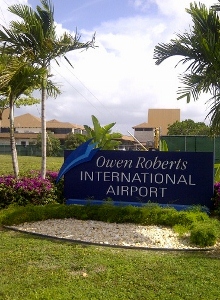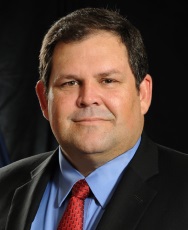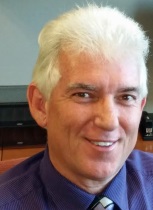Cayman News
Cayman News's Latest Posts

Cop’s gun seized at airport
 (CNS): A serving police officer whose gun was seized at the airport as he went through security has not been arrested and is still on active duty, the police have confirmed. Inspector Lauriston Burton, who is a licensed firearms holders, was stopped by customs back in October when his gun was spotted in his carry-on bag. Burton claimed to have the firearm in error and was allowed to continue his journey without any arrest. Police have said an enquiry has been underway for the last three months but Burton has not been charged and remains on full active duty. In contrast, on several occasions last year visitors with gun license, mistakenly travelling with ammunition, were arrested, charged and fined as a consequence.
(CNS): A serving police officer whose gun was seized at the airport as he went through security has not been arrested and is still on active duty, the police have confirmed. Inspector Lauriston Burton, who is a licensed firearms holders, was stopped by customs back in October when his gun was spotted in his carry-on bag. Burton claimed to have the firearm in error and was allowed to continue his journey without any arrest. Police have said an enquiry has been underway for the last three months but Burton has not been charged and remains on full active duty. In contrast, on several occasions last year visitors with gun license, mistakenly travelling with ammunition, were arrested, charged and fined as a consequence.
According to Marlon Bodden, a former senior police officer who now heads up the enforcement arm of the customs department, when the gun and ammunition were spotted as the bag was x-rayed, it was seized. But Burton, originally from Jamaica, was not arrested and was allowed to continue his journey.
The officer told customs staff that he had intended to drop the gun and ammunition with a named person on his licence for safe keeping during his absence from home but forgot.
“This being the case, HM Customs made the decision, in consultation with the RCIPS, that this matter is best dealt with administratively. The firearm was retained by HM Customs and the matter referred to the RCIPS for further investigation,” Bodden stated. He added that Burton then continued his journey while customs took the weapon and the bullets.
The police confirmed with CNS this week that Burton’s firearms licence has been suspended and an investigation is being conducted into the circumstances surrounding the officer’s possession of the weapon at the airport.
“Once completed, the file will be forwarded to the director of public prosecutions,” an RCIPS spokesperson said. “The officer remains on full operational duty.”
This is a contrast to a number of arrests at the airport during 2014 where visitors to Cayman were arrested, charged, processed through the courts and fined heavily for their errors and lapse of memory. On four occasions licensed firearms holders from the US have been fined between $1000 -$3000, have been held in custody and had to hire lawyers or extend their stay to face the consequences of their carelessness in the local courts.
A magistrate last summer told an American visitor in such a predicament that Cayman has a “harsh regime because we’ve decided we don’t want guns here.” Raising his concerns about casual approaches to lethal weapons, he added, “It boggles the mind that people have ammunition in backpacks and don’t even know it.”
Nevertheless, Burton seems to have so far been given a pass. After three months of investigation, aside from the suspension of his private firearms licence, there have been no other consequences for the serving police officer.
The latest revelation from the police comes in the wake of the shocking revelation that an RCIPS police officer had been recruited to the service while being under investigation for murder. After being on required leave for two years, he was recalled back to work by Police Commissioner David Baines around ten months before his trial in Jamaica, where he was convicted.

80% say no to beneficial ownership register
 (CNS Business): Government released a report Tuesday on the public consultation it carried out earlier this year regarding how the jurisdiction should tackle the issue of access to who really owns offshore entities registered in the Cayman Islands. The report revealed that over 80% of the people and organizations that responded do not believe Cayman needs a central register with public access and opted for the status quo, leaving the collection of information to the corporate service providers. Most of those who took part in the consultation said a publicly accessible central registry would create a significant financial burden, violate privacy and information security and put the offshore industry at risk. Read more on CNS Business
(CNS Business): Government released a report Tuesday on the public consultation it carried out earlier this year regarding how the jurisdiction should tackle the issue of access to who really owns offshore entities registered in the Cayman Islands. The report revealed that over 80% of the people and organizations that responded do not believe Cayman needs a central register with public access and opted for the status quo, leaving the collection of information to the corporate service providers. Most of those who took part in the consultation said a publicly accessible central registry would create a significant financial burden, violate privacy and information security and put the offshore industry at risk. Read more on CNS Business

Cayman e-business made easy
 (CNS Business): One of the problems with e-business in the Cayman Islands is the cost involved and the length of time it takes to set it up. But a new IT company makes it so easy, they say you can be up and running in 15 minutes for as little as CI $125 per month. CaymanAisles, run by John Bodden and Megan McLean, is designed so that retailers can sell their products through the internet via their website caymanaisles.com. “The best way to describe it is that it’s like amazon.com but for Cayman retailers only,” McLean explained. But unlike Amazon, retailers have their own website within caymanaisles.com, which they can customize, such as change colours and add headers. Read more on CNS Business
(CNS Business): One of the problems with e-business in the Cayman Islands is the cost involved and the length of time it takes to set it up. But a new IT company makes it so easy, they say you can be up and running in 15 minutes for as little as CI $125 per month. CaymanAisles, run by John Bodden and Megan McLean, is designed so that retailers can sell their products through the internet via their website caymanaisles.com. “The best way to describe it is that it’s like amazon.com but for Cayman retailers only,” McLean explained. But unlike Amazon, retailers have their own website within caymanaisles.com, which they can customize, such as change colours and add headers. Read more on CNS Business

Former Cayman police commissioner dies aged 90
 (CNS): Former Cayman Islands commissioner of police, Jim Stowers, has died aged 90. Stowers first came to Cayman in in 1976 for two years to train the police and returned in 1980 to serve as commissioner of police, a post he held for five years. During the royal visit in 1983 Queen Elizabeth presented him with the Queens' Police Medal for distinguished service. While he was commissioner, he was very active in policing drug trafficking and money laundering measures, presenting papers and lectures at Interpol conferences in Europe, the Caribbean and USA, including the FBI, according to the local media in Cornwall, where Stowers lived. He was described by friends as “an exceptional, special gentleman”. (Photo: Former Police Commissioner Jim Stowers, left, with Queen Elizabeth and Prince Philip in the Cayman Islands in 1983)
(CNS): Former Cayman Islands commissioner of police, Jim Stowers, has died aged 90. Stowers first came to Cayman in in 1976 for two years to train the police and returned in 1980 to serve as commissioner of police, a post he held for five years. During the royal visit in 1983 Queen Elizabeth presented him with the Queens' Police Medal for distinguished service. While he was commissioner, he was very active in policing drug trafficking and money laundering measures, presenting papers and lectures at Interpol conferences in Europe, the Caribbean and USA, including the FBI, according to the local media in Cornwall, where Stowers lived. He was described by friends as “an exceptional, special gentleman”. (Photo: Former Police Commissioner Jim Stowers, left, with Queen Elizabeth and Prince Philip in the Cayman Islands in 1983)
Stowers served on a river class frigate in the Royal Navy during the Second World War, both in the Atlantic and the invasion of Sicily, reports the Torquay Herald Express.
After learning the 48 letters of the Japanese morse code, he volunteered to join wireless intelligence, which took him to Burma and French Indo China. When he was demobilised, Jim joined the Merchant Navy for a time as a radio officer on the Cunard troopship Franconia for the evacuation from Palestine and India.
Stowers began his police career in Torquay and he served 18 years in the CID in South Devon, including a spell in Brixham. He rose through the ranks to become acting assistant chief constable for Devon and Cornwall.
After returning home from the Cayman Islands in 1985, he lectured at the Bramshill Police College and became a research fellow at the University of Exeter, and tutor on the MA degree course in police and criminal justice.
Between 1986 and 1989 he undertook two surveys covering 11 dependent and independent countries in the Caribbean as head of team on behalf on the British government.
Stowers married his late wife, Eileen, in 1947 and the couple went on to have two sons, Jim and John.
Stowers’ funeral will be held on Saturday at St Michael's Church, Teignmouth, at 11am.

Bermuda gives green light to casino gambling
 (CNS Business): Amid debate and controversy, Bermuda has passed legislation to allow casino gaming on the island. After a 10-hour debate in the House of Assembly the Casino Gaming Act 2014, tabled by Tourism Minister Shawn Crockwell, was passed in the early hours of Saturday morning. This follows the Cruise Ship (Casino) Act 2013, passed in October last year, which allowed cruise ships to keep their casinos open while overnighting in port on the island. According to the Royal Gazette, Crockwell told the House during the debate on the new law he was confident casino gaming was right for Bermuda and that most Bermudians supported the legalisation, although he acknowledged that the subject remained a sensitive and emotive issue for some. Read more and comment on CNS Business
(CNS Business): Amid debate and controversy, Bermuda has passed legislation to allow casino gaming on the island. After a 10-hour debate in the House of Assembly the Casino Gaming Act 2014, tabled by Tourism Minister Shawn Crockwell, was passed in the early hours of Saturday morning. This follows the Cruise Ship (Casino) Act 2013, passed in October last year, which allowed cruise ships to keep their casinos open while overnighting in port on the island. According to the Royal Gazette, Crockwell told the House during the debate on the new law he was confident casino gaming was right for Bermuda and that most Bermudians supported the legalisation, although he acknowledged that the subject remained a sensitive and emotive issue for some. Read more and comment on CNS Business

Former COO at C&W takes on e-gov challenge
 (CNS Business): TheCabinet office has appointed Ian Tibbetts to take on the task of dragging the Cayman Islands Government into the 21st century and help it provide many more services via the internet. A former chief operating officer with Cable and Wireless with extensive communications experience, the new director of e-government has been given the challenge of getting public services online and meeting the policy objectives to cut the cost of service delivery and make CIG more effective and efficient. Having taken up the post at the beginning of this month, Tibbetts will lead the development of technology and systems in the public sector to allow people to do business with government, including the financial services sector. Read more on CNS Business
(CNS Business): TheCabinet office has appointed Ian Tibbetts to take on the task of dragging the Cayman Islands Government into the 21st century and help it provide many more services via the internet. A former chief operating officer with Cable and Wireless with extensive communications experience, the new director of e-government has been given the challenge of getting public services online and meeting the policy objectives to cut the cost of service delivery and make CIG more effective and efficient. Having taken up the post at the beginning of this month, Tibbetts will lead the development of technology and systems in the public sector to allow people to do business with government, including the financial services sector. Read more on CNS Business

The indirect consequences of Ebola
10 years ago, I recall desperately seeking home content insurance with the threat of Hurricane Dean looming in our midst. Having experienced the lessons of Hurricane Ivan, all 6 insurance company representatives smiled (some laughed) and told me to come back the next week, (once the storm had passed).
Whilst Cayman was fortunate to escape the wrath of Dean, the same reaction is being faced now by many emergency response delegates responding to the Ebola crisis. Given the current statistics, insuring health workers and volunteers working in the field is being considered a “Big Ask” and whilst most are covered for general health care and accidents, ‘epidemics’ aren’t often covered under such policies. Hence there are a number of personal risking their lives in the fight against Ebola who have no health insurance. So the question is, “How are we protecting/ supporting our ‘front line’ workers and volunteers, (many of whom are unpaid) in carrying out this heroic task? Are we doing enough?”
If the insurance concerns weren’t enough, many are facing other issues. Whilst these very workers are having a real impact on decreasing the spread of Ebola in West Africa, many who return home having completed their ‘assignment’ are not being treated to the ‘hero’s welcome’ they deserve but to fear, rejection and in some cases, isolation by their friends, family and community.
Having attended the IFRC’s Regional Ebola Preparedness Conference last week in Panama, I heard several stories first hand of Red Cross delegates who had recently been working in Ebola Treatment Centres in Sierra Leone, Guinea and Liberia.
One in particular commented that returning home was more difficult then the mission itself. Another delegate from Chad was locked up when he returned home only to be ‘sent back’ to Liberia the next day. Others have returned home to “Western civilization” only to be quarantined or rejected and shunned by their communities. By way of example, Martha, on returning home to Spain was hounded by the media after her neighbor ‘exposed’ her.
Despite taking all necessary precautions (testing her temperature twice daily and being closely monitored etc.), she experienced significant adversity as did her roommate who was refused entry to his school for 21 days despite never stepping foot in West Africa. Whilst I thoroughly appreciate the global concerns about Ebola and the need to take precautionary measures, such treatment is fundamentally unjust, disproportionate and will likely reduce delegates’ ability/ willingness to work in affected countries in the future.
On a different note, countries spending significant expenditure to control their borders/ set up internal emergency response structures etc. is somewhat futile if the root of the cause, the affected countries themselves aren’t being substantially invested in (to prevent the further spread of infection).
Furthermore when so many countries are desperately seeking supplies, namely personal protection gear, masks etc, producers of such items simply can’t keep up with the demand. As a consequence, such equipment is becoming increasingly difficult to access, and whilstmany countries can afford to purchase supplies ‘just in case’, priority must undoubtedly be given to those directly affected today. Unfortunately this isn’t necessarily the case.
Whilst I have already mentioned the ‘stigma’ associated with emergency response delegates and volunteers, stigmatization and racial stereotyping of African nationals is also on the rise with the epidemic.
As so eloquently put by one of the responders from Sierra Leone (JP), the battle of the Red Cross is to:
1) Fight the Ebola virus
2) Provide a voice of reason against fear and stigmatization
Similar to the post 9/11 reaction, it appears in some countries that anyone who has a connection with ‘Africa’ is considered a potential threat whilst in reality the affected areas are in West Africa (Sierra Leone/ Liberia/ Guinea/ Mali) and are microscopic given the size of the African continent.
Whilst Ebola outbreaks have been around since 1976, it is still a largely ‘unknown area’, often phrased “Fearabola”. The epidemic is largely one of fear as opposed to direct science and whilst there is a real and direct threat to those living in affected areas (in particular those caring for the sick or carrying out ritualistic burial procedures), the threat to the rest of the world is not as critical as some media outlets would like us believe. There is a real need for us to attempt to understand the reality surrounding Ebola in order to prevent further spread of fear and stigmatization.
In keeping with the theme of ‘Fearabola’, rumours amongst many nationals in affected countries as to the root cause of the epidemic is rife. By way of example, as described to a Red Cross delegate, the reason why Ebola started was because an ‘invisible plane full of witches crashed in West Africa’, others believe that ‘Ebola was spread by rain drops’ or by ‘Aid workers who want to take over the continent’ or ‘who are carrying out experiments and want to use West African nationals to practice on’. Several delegates had been chased away by locals or had their ambulances burnt and Ebola treatment centres (where they worked) sabotaged.
This sounds disturbing from an outsiders perspective, however who can blame a community when one of its’ members gets sick and are taken away by health workers dressed in ‘alien’ suits who refuse to allow them to say an intimate goodbye to a loved one nor bury family members in accordance with their cultural and religious burial practices? Whilst the reputation of aid workers responding to the crisis is slowly improving and understanding is on the rise, there is still distrust/ denial associated with these ‘aliens’, hence why decreasing the spread of Ebola is rife with numerous issues.
As JP stated, the approach by many response agencies in the field has been a ‘public health’ approach but this alone is insufficient. In the 3 countries most greatly affected, there are significant religious, ethnic, cultural and social aspects that we need to engage in in order that a humanitarian response is effective. We need to be working with community leaders, religious entities and other stakeholders who “know” their own people and who are more likely to be listened to then an outsider.
Just food for thought……..

Failing Hannah
Local media covered, to some extent, the premiere and success of “Hannah’s Confession”, the play by local award-winning playwright Patricia Marie Bent which debuted at the Harquail Theatre in September and was brought back by popular demand in November. Nearly every news outlet spoke of the excellence of the cast, the well-constructed dialogue and plot, and the realistic portrayal of what goes on in the not so visible corners of “Product Cayman”.
The few outlets that covered the work more extensively touched on the darker themes of the play — domestic violence, child abuse, substance abuse, bullying — but did so from a safer distance, favoring to highlight what was described as the “positive message” within it all.
“Hannah’s Confession” was brilliant, not only due to its ability to spotlight these “darker themes” — the willfully ignored or outright downplayed reality of Beloved Isle Cayman — but also by being able to highlight how we, as a society, have failed our children at every turn. From the family members/“nosy next door neighbours”, to the church, schools, police service, and social services “Hannah’s Confession” lays out in simple ways all the missed opportunities for protection and intervention, distributes the responsibility equally among the different sectors of our community and turns the mirror on its audience for, at the very least, introspection.
What the news outlets failed to cover was that the most jarring, disturbing and outright infuriating aspects of the experience for some audience members were not those that took place on stage and not for lack of content. During a particularly difficult scene, where Hannah’s mother and father (portrayed by the incredible Rita Estevanovich and Michael McLaughlin) end up in a confrontation that quickly turns violent and highlights both actors’ commitment to the role as they realistically portray a no-holds-barred physical fight, the overwhelming audience response was not outrage or shock; it was laughter.
Comedy club laughter.
To clarify: there were numerous parts of the play’s dialogue that were intentionally funny, and the delivery by the actors made them outright hilarious. Yet there was no discernment among a good number of audience members between the comedy and the drama. This was not the only scene that evoked this inappropriate response, among them was also the scene where the mother’s new boyfriend is making overtly sexual passes at the young Hannah, who is clearly uncomfortable.
The inappropriate reaction to seeing sexually abusive behavior towards a child as well as acts of physical violence being perpetrated were not expressed solely by the young people who were watching the play. Adults too, both Caymanians and expats, in various capacities, including educators and other professionals, were among those finding humor in the situation.
Those who left the theatre feeling disconcerted and disgusted have been pondering how to make sense of this experience and more broadly what it means as it pertains to the state of our community.
To attribute this reaction, which members of the cast confirmed were the norm and not the exception, to our immature theatre culture and inability to process anything other than comedies is a far too kind and rose-coloured explanation of what appears to be a much more troubling reality.
On the one hand, perhaps the reality portrayed on stage is in fact so commonplace for those who experience it daily that, in their struggle to keep their head above water, they have lost their ability to empathize with another with similar struggles. It is an utterly indifferent response expressed through statements like: “I get my licks, so why I must feel sorry for you?”, “Das how it go”, “That’s life”, or the myriad of other ways which reaffirm that this type of violence is normal.
On the other hand, perhaps as a community we have become so accustomed to consuming violence in its various forms — in our communities, on TV, at the movies, in our news, via our radio, online and in our games — that we have become truly desensitized to it.
In a world where the brutal beating of a toddler by her Ugandan nanny is captured on film and disseminated so as to attain “viral” status, a man pushing a woman with such force so as to make her lose her footing and fall hard is a meaningless act by comparison. In our mass consumption we have grown increasingly tolerant as violence is now measured comparatively against the great archive of violent acts stored in our psyche.
There may be those who think this is a gross overreaction, but consider this: what message was sent to the young members of the cast, whose ages ranged from 8-16, when emotionally charged, threatening, violent and serious situations were met with such response?
Worse yet, who can guarantee that this cavalier reaction is confined to the theatre? What of the child who presents with signs of abuse to one of these adults? A mandate to report is not a mandate to empathise, so with what reaction will s/he be greeted?
Those among us who work on trying to raise awareness of issues such as child sexual abuse and domestic violence have long held to the hope that making our population aware is half the battle won. Our belief has been that in helping to publicly assert that these things are happening and helping our people correctly name our problems we will take the most necessary step towards collectively finding a solution for it.
Yet, the cast of “Hannah’s Confession” laid out our problems on a silver platter, with all the trimmings, and provided us with a service next to none. Their last two performances, in fact, took place within the context of a Cayman Islands where six year old Bethany Butler was brutally stabbed multiple times by her mother just weeks prior. If ever there was a time for the messages to resonate, this should have been it.
And still there was laughter.

Brac crews to test mettle with mock emergency
(CNS): Following the recent simulated air plane crash on Grand Cayman that put emergency crews through their paces, fire crews, police offiers, medical personnel and airport staff on Cayman Brac will be put to the test to hone their emergency response skills during a mock crash. The exercise called “Rescue Me” has been organized by the Cayman Islands Airports Authority (CIAA) and will be staged at the Charles Kirkconnell International Airport (CKIA) on Tuesday 25 November. The focus is similar to “The Real Deal” exercise that was held in Grand Cayman earlier this month.
The time and exact location of the exercise is confidential but motorists in Cayman Brac are being advised to expect some traffic disruptions around the CKIA area today.
“Emergency Responders will render appropriate services in order to save life and property and the airport and airline will focus on taking care of family and friends of the victims of the mock airline crash in the immediate aftermath of the incident,” officials stated.
“The Real Deal” saw for the first time family and friends of crash victims assisted by officials as well. CIAA’s senior manager, safety management systems and chairman of the Airport Emergency Planning Committee, Andrew McLaughlin, said, “The Real Deal exercise revealed that continued improvement is needed in this vital area as the airport and airlines continue to work together with the limited resources available to ensure proper treatment of friends and family during this very stressful time.”
The Airport Emergency Planning Committee comprises representatives of CIAA, Airport Rescue and Fire Fighting Services, Royal Cayman Islands Police Service, Health Services Authority and the Sisters Islands Emergency Committee (SIEC). During this exercise they will be assisted by the Cayman Islands Red Cross, Government Information Services, Public Safety Communications Centre 9-1-1 and airline partners.
CIAA would like to apologize for any inconvenience this may cause, however these types of exercises are necessary in order for CIAA to meet international requirements and to test the readiness of emergency responders.

Breeze Fusion on the home stretch
 (Radio Cayman): We’re heading down the home stretch to The 8th Annual Breeze Fusion Walk/Run thisSaturday, November 1st. Walkers will start off from Smith’s Cove at 6:30am, with runners setting out at 6:45am. This family event is now a more competitive 5k or 3.1 miles and, for the first time, includes a separate children’s race. Part proceeds go to the National Council for Voluntary Organizations (NCVO), adding to its recent fundraising Radio/Telethon this past weekend and John Gray High School’s “Helping Hands Program”.
(Radio Cayman): We’re heading down the home stretch to The 8th Annual Breeze Fusion Walk/Run thisSaturday, November 1st. Walkers will start off from Smith’s Cove at 6:30am, with runners setting out at 6:45am. This family event is now a more competitive 5k or 3.1 miles and, for the first time, includes a separate children’s race. Part proceeds go to the National Council for Voluntary Organizations (NCVO), adding to its recent fundraising Radio/Telethon this past weekend and John Gray High School’s “Helping Hands Program”.
As the countdown begins in earnest to Radio Cayman’s & Breeze FM’s signature event, Deputy Director Paulette Conolly-Bailey says, “Just like Radio Cayman, the Breeze Fusion Walk/Run has a special place in my heart because of what it represents to our community and the lives it touches from the funds raised. I’m delighted that the event is growing every year and we have reached our 8 year milestone. Rain or shine it’s going to be another superb family event for our charitable causes.”
Principal of John Gray High School, Lyneth Monteith, is also enthusiastic, “JGHS is grateful to Radio Cayman for selecting the school’s “Helping Hands” Project as a recipient. Our students face many challenges and to be able to support them in overcoming these challenges, will lead to them being able to achieve success at school, as they work to be the best that they can be.”
Major sponsors include Cayman National, ROMA United Sports Club, Maedac Supply Company/WATA and Grand Old House, with numerous Associate Sponsors providing cash as well as gift certificates.
Registration is $15.00 for adults, $10.00 for students under sixteen and is ongoing at radiocayman.gov.ky and caymanactive.com/breeze, on October 31st at Grand Old House, 5:00 until 8:00pm. Final chanceto register is at 6:00am at the event. All participants receive an event t-shirt & goodie bag. Trophies go to the overall male & female finishers in the run, along with medals & prizes to the top competitors in each age category for both the run & walk. Random prizes will also be up for grabs. Breeze Fusion is organized by Radio Cayman/Breeze FM and the Phoenix Athletic Club, assisted by Coach Jerry Harper and service club volunteers.
